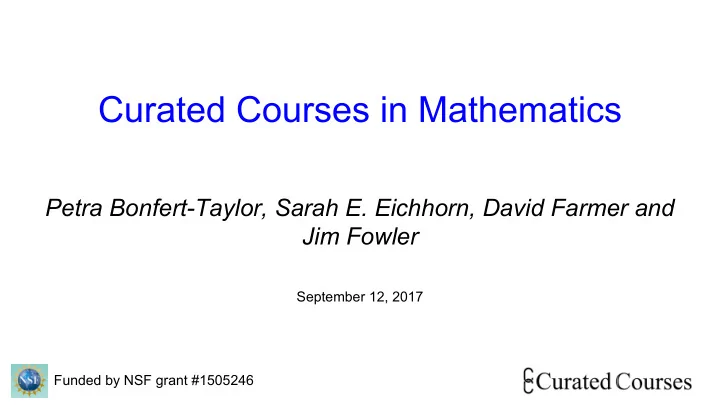

Curated Courses in Mathematics Petra Bonfert-Taylor, Sarah E. Eichhorn, David Farmer and Jim Fowler September 12, 2017 Funded by NSF grant #1505246
Abstract: Curated Courses in Mathematics is a project to create, gather, curate, tag, review, organize and make available high quality online open educational mathematics resources. The project aims to coordinate work being done at multiple institutions on similar courses, enabling faculty to share resources they create or curate from other sources. By creating a system for curating and tagging resources our hope is that faculty can more easily find high quality materials to utilize in their classes and more broadly disseminate good resources they create. We will describe the project itself, describe resources we have created for faculty about how to design and produce online mathematics content, describe our tagging system for content submitted to our site as well as present our future goals for the project.
Introduction to the CuratedCourses Project
Curated Courses in Mathematics ( ) Project to: ● Create and ● Curate (gather, tag, organize, review, make available) high quality online open educational mathematics resources. Motivation?
Active Learning ● Rather than passively listening to information being transmitted: students learn through activities and/or discussions. ● Large body of scientific evidence asserts: ○ Retention improves significantly if learning is active. ○ Active learning leads to significantly lower failure rates in STEM classes.
Sample Activities ● Small group discussion ● Peer instruction ● Clickers ● Problem-based learning ● Group tests ● Concept mapping ● ...
Difficulty ● Creating educational mathematics resources is time-consuming. ○ Videos ○ Online quizzes ○ In-class activities ○ Simulations ○ … ● Additional time has to be spent to decide on ○ best tools ○ best practices ● Sharing such resources is currently not the norm. ● Many great resources are "stuck" in LMS's or other password-protected sites.
Solution: CuratedCourses in Mathematics! ● Current focus: Linear Algebra ● Types of resources we curate: ○ Video ○ Worksheets ○ Quizzes ○ Lesson plans ○ Clicker questions ○ Etc. ● Website: https://curatedcourses.org/
CuratedCourses Website
Demonstration Supplementary material in the margin (demonstrate how a resource shows up in the margin of a textbook automatically)
Resources for Creating and Using Content
Activity: What challenges do you see in creating online mathematics content?
Resources : How to Design and Produce Content (for students to view outside class) Guidelines and details for: ● Audio/video recording ● Screencasting ● Green screening ● Lightboard videos ● Accessibility (coming soon!)
Resources: Making Videos with Paper and Pen Jim Fowler The Ohio State University
Resources: Making Screencasts I Petra Bonfert-Taylor Dartmouth College
Resources: Making Screencasts II Joy Zhou Lafayette College
Resources: Making Lightboard Videos Tom Roby University of Connecticut
Resources: Green Screening Shaunt Kouyoumdjian University of California, Irvine
Resources : How to Utilize Open Educational Resources (OERs) to Support Evidence-Based Instructional Practices JMM 2018 Minicourse: “Flipping your Mathematics Course using Open Educational Resources” * Minicourse presentation slides and handouts to be available on Curated Courses website
CC Logo
The CuratedCourses Tagging System
Links to Resources
CC Logo
Future Goals
CuratedCourses beyond linear algebra (and mathematics) There are already repositories outside of mathematics, such as MERLOT and Currwiki and Unizin’s Course Development Suite. Often these systems only digest coarse-grained content, i.e., content tagged as “linear algebra” instead of say the more specific “Linear systems have zero, one, or infinitely many solutions.” For math courses besides linear algebra, a challenge is the design of the tags. For instance, is there a useful collections of “calculus tags” available? That calculus courses are mostly built from examples is a barrier to creating “concept tags” (but consider the approach of SIMIODE). Resources which aren’t presented as “source” is another challenge, and a challenge we’re already experiencing with video.
“As We May Think Teach” A vision of the future of online education resources The most personalized part of the internet is... online shopping (!) There are structures in the e-commerce ecosystem that can be transported to online education, but haven’t yet been brought over. “Advertising” is key to discovering new content. Advertisers have already realized the goals of “adaptive learning.” For CuratedCourses, “advertising” means related content we add to the margin. We provide JavaScript that can be used on any page to highlight related resources. “Analytics” is key to iterating on design. Google Analytics tracks conversions for sales. Imagine a similar product for education which would track learners across multiple platforms and record learning events for later analysis.
Academic Credit How can we incentivize the creation of high-quality materials? If CuratedCourses were a “journal” then curation might be akin to refereeing, and “published resources” may receive academic credit. A similar shift is arguably happening in research: projects like Harvard’s Dataverse and the R Journal are examples where data and code receive citations (cf. Elsevier’s list). Data repositories face many of the same challenges as education object repositories: ● Managing metadata ● Archiving content in formats that useful in the long-term ● Making content accessible to researchers/learners ● Handling multiple versions of content ● Revealing the license and ownership clearly
CuratedCourse’s goal is to be glue, not a garden. Business works on the internet because of “technologies” like EDI (Electronic data interchange) for presenting invoices, orders, shipping notices, etc. Edtech mostly doesn’t have good enough glue between different technologies, with perhaps LTI being the closest analogue to EDI, (and frankly LTI doesn’t work that well.) Does your edtech tool expose a web-accessible API? The vision for CuratedCourses is to relate resources between different (walled) gardens, which permits the sharing of content (advertising) and understanding what content is effective (analytics). Manage metadata with parsimonious extensions to open formats like OpenGraph, Dublin Core. Store content in source formats (just as the arXiv prefers TeX over PDF). Make content accessible by providing content-addressible blob storage. Handle multiple versions of content by training instructional staff and students to use version control.
Questions?
Recommend
More recommend